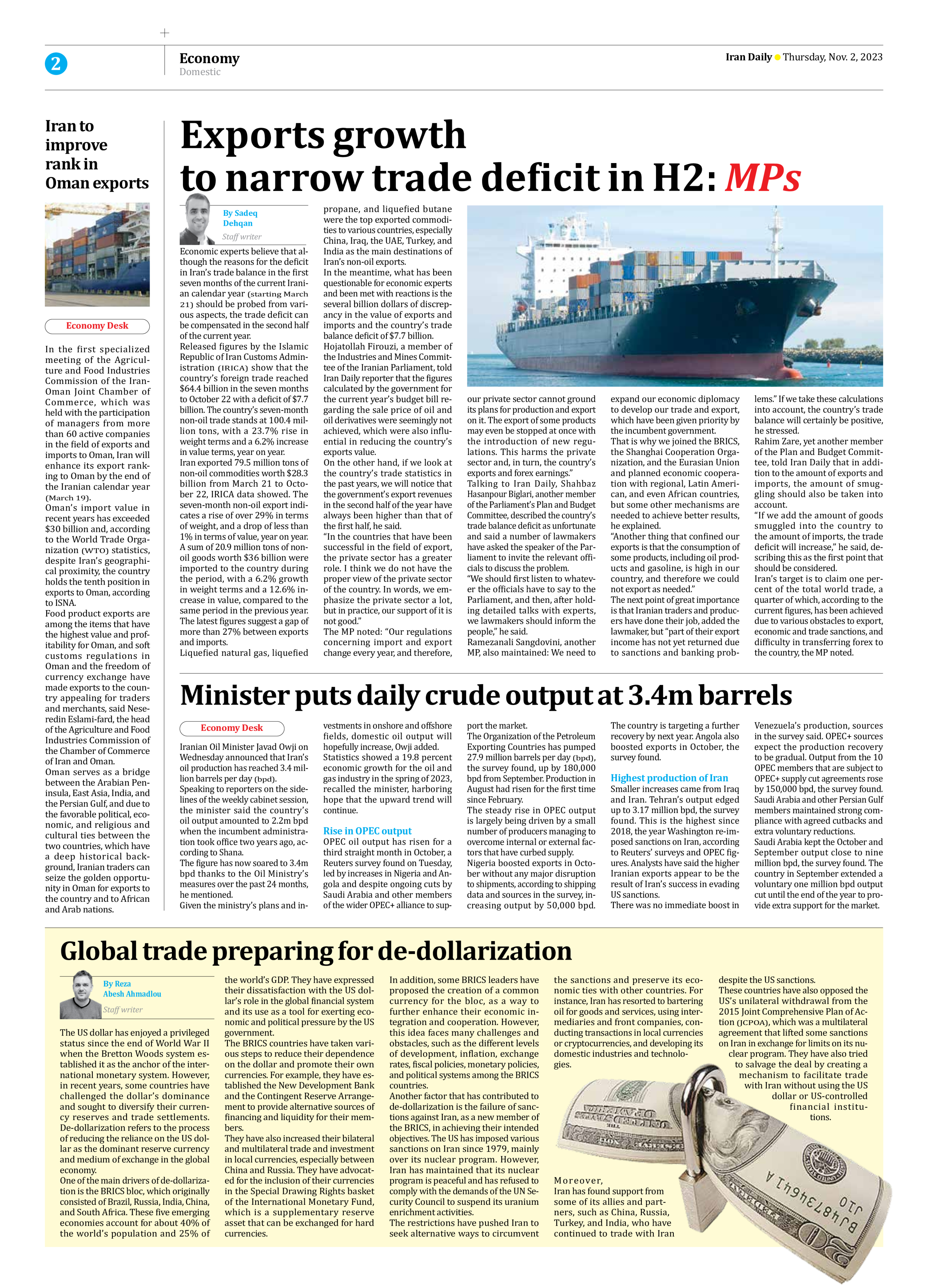
Exports growth to narrow trade deficit in H2: MPs
By Sadeq Dehqan
Staff writer
Economic experts believe that although the reasons for the deficit in Iran’s trade balance in the first seven months of the current Iranian calendar year (starting March 21) should be probed from various aspects, the trade deficit can be compensated in the second half of the current year.
Released figures by the Islamic Republic of Iran Customs Administration (IRICA) show that the country’s foreign trade reached $64.4 billion in the seven months to October 22 with a deficit of $7.7 billion. The country’s seven-month non-oil trade stands at 100.4 million tons, with a 23.7% rise in weight terms and a 6.2% increase in value terms, year on year.
Iran exported 79.5 million tons of non-oil commodities worth $28.3 billion from March 21 to October 22, IRICA data showed. The seven-month non-oil export indicates a rise of over 29% in terms of weight, and a drop of less than 1% in terms of value, year on year.
A sum of 20.9 million tons of non-oil goods worth $36 billion were imported to the country during the period, with a 6.2% growth in weight terms and a 12.6% increase in value, compared to the same period in the previous year. The latest figures suggest a gap of more than 27% between exports and imports.
Liquefied natural gas, liquefied propane, and liquefied butane were the top exported commodities to various countries, especially China, Iraq, the UAE, Turkey, and India as the main destinations of Iran’s non-oil exports.
In the meantime, what has been questionable for economic experts and been met with reactions is the several billion dollars of discrepancy in the value of exports and imports and the country’s trade balance deficit of $7.7 billion.
Hojatollah Firouzi, a member of the Industries and Mines Committee of the Iranian Parliament, told Iran Daily reporter that the figures calculated by the government for the current year’s budget bill regarding the sale price of oil and oil derivatives were seemingly not achieved, which were also influential in reducing the country’s exports value.
On the other hand, if we look at the country’s trade statistics in the past years, we will notice that the government’s export revenues in the second half of the year have always been higher than that of the first half, he said.
“In the countries that have been successful in the field of export, the private sector has a greater role. I think we do not have the proper view of the private sector of the country. In words, we emphasize the private sector a lot, but in practice, our support of it is not good.”
The MP noted: “Our regulations concerning import and export change every year, and therefore, our private sector cannot ground its plans for production and export on it. The export of some products may even be stopped at once with the introduction of new regulations. This harms the private sector and, in turn, the country’s exports and forex earnings.”
Talking to Iran Daily, Shahbaz Hasanpour Biglari, another member of the Parliament’s Plan and Budget Committee, described the country’s trade balance deficit as unfortunate and said a number of lawmakers have asked the speaker of the Parliament to invite the relevant officials to discuss the problem.
“We should first listen to whatever the officials have to say to the Parliament, and then, after holding detailed talks with experts, we lawmakers should inform the people,” he said.
Ramezanali Sangdovini, another MP, also maintained: We need to expand our economic diplomacy to develop our trade and export, which have been given priority by the incumbent government.
That is why we joined the BRICS, the Shanghai Cooperation Organization, and the Eurasian Union and planned economic cooperation with regional, Latin American, and even African countries, but some other mechanisms are needed to achieve better results, he explained.
“Another thing that confined our exports is that the consumption of some products, including oil products and gasoline, is high in our country, and therefore we could not export as needed.”
The next point of great importance is that Iranian traders and producers have done their job, added the lawmaker, but “part of their export income has not yet returned due to sanctions and banking problems.” If we take these calculations into account, the country’s trade balance will certainly be positive, he stressed.
Rahim Zare, yet another member of the Plan and Budget Committee, told Iran Daily that in addition to the amount of exports and imports, the amount of smuggling should also be taken into account.
“If we add the amount of goods smuggled into the country to the amount of imports, the trade deficit will increase,” he said, describing this as the first point that should be considered.
Iran’s target is to claim one percent of the total world trade, a quarter of which, according to the current figures, has been achieved due to various obstacles to export, economic and trade sanctions, and difficulty in transferring forex to the country, the MP noted.







